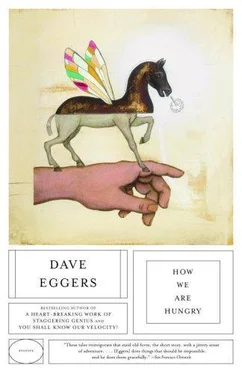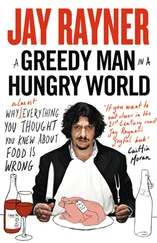Dave Eggers - How We Are Hungry
Здесь есть возможность читать онлайн «Dave Eggers - How We Are Hungry» весь текст электронной книги совершенно бесплатно (целиком полную версию без сокращений). В некоторых случаях можно слушать аудио, скачать через торрент в формате fb2 и присутствует краткое содержание. Год выпуска: 2005, Издательство: Vintage Canada, Жанр: Современная проза, на английском языке. Описание произведения, (предисловие) а так же отзывы посетителей доступны на портале библиотеки ЛибКат.
- Название:How We Are Hungry
- Автор:
- Издательство:Vintage Canada
- Жанр:
- Год:2005
- ISBN:нет данных
- Рейтинг книги:3 / 5. Голосов: 1
-
Избранное:Добавить в избранное
- Отзывы:
-
Ваша оценка:
- 60
- 1
- 2
- 3
- 4
- 5
How We Are Hungry: краткое содержание, описание и аннотация
Предлагаем к чтению аннотацию, описание, краткое содержание или предисловие (зависит от того, что написал сам автор книги «How We Are Hungry»). Если вы не нашли необходимую информацию о книге — напишите в комментариях, мы постараемся отыскать её.
A Heartbreaking Work of Staggering Genius
How We Are Hungry — читать онлайн бесплатно полную книгу (весь текст) целиком
Ниже представлен текст книги, разбитый по страницам. Система сохранения места последней прочитанной страницы, позволяет с удобством читать онлайн бесплатно книгу «How We Are Hungry», без необходимости каждый раз заново искать на чём Вы остановились. Поставьте закладку, и сможете в любой момент перейти на страницу, на которой закончили чтение.
Интервал:
Закладка:
It’s Jerry.
“You know you didn’t have to save, Dad.”
“But Michael. We planned this for years. I talked to you about this when you were ten. Remember? When Uncle Mark came back? Christ!”
“Dad, I just—”
“And here you’re going down after one freaking day!”
“Listen. I have never felt so weak, Dad. It’s just so much harder than—”
“Michael. Yesterday was the hardest day — the rest will be nothing. You heard what’s-his-face… Frank. This was the hard one. I can see why you’re a little concerned, but you gotta buck up now, son. Yesterday was bad but—”
“Shhh.”
“No one can hear us, Michael. For heaven’s sake. Everyone’s asleep.”
“Shh!”
“I will not have you shushing me! And I won’t have you—”
There is the sound of a sleeping bag being adjusted, and then the voices become lower and softer.
“I will not have you leaving this—”
And the voices dip below audibility.
Shelly is awake now, too. She has been listening, and gives Rita a raised eyebrow. Rita reciprocates, and begins searching through her duffel bag for what to wear today. She has brought three pairs of pants, two shorts, five shirts, two fleece sweat-shirts, and her parka. Putting on her socks, wool and shaped like her foot, the ankle area reinforced and double-lined, she wonders if Mike will actually be going down so soon. There is a spare garbage bag into which she shoves her dirty socks, yesterday’s shirt, and her jogging bra, which she can smell — rain and trees and a musty sweat.
“You’d have to break my leg,” Shelly whispers. She is still in her sleeping bag, only her face visible. Rita suddenly thinks she looks like someone. An actress. Jill Clayburgh. Jane Curtin? Kathleen Turner.
“Break my leg and cut my tendons. You’d have to. I’m doing this climb.”
Rita nods and heads toward the tent’s door flap.
“If you’re going outside,” Shelly says, “give me a weather report.”
Rita pokes her head through the flaps and is facing fifteen porters. They are all standing in the fog, just across the campsite, under the drizzle, some holding cups, all in the clothes they were wearing yesterday. They are outside the cooking tent, and they are all staring at her face through the flap. She quickly pulls it back into the tent.
“What’s it like?” Shelly asks.
“Same,” Rita says, having never felt so sad.
Breakfast is porridge and tea and orange slices that have been left in the open air too long and are now dry, almost brown. There is toast, cold and hard and with hard butter needing to be applied with great force. Again the five paying hikers are hunched over the small card table, and they eat everything they can. They pass the brown sugar and dump it into their porridge, and they pass the milk for their coffee, and they worry that the caffeine will give them the runs and they’ll have to make excessive trips to the toilet tent, which now everyone dreads. Rita had wondered if the trip might be too soft, too easy, but now, so soon after getting here, she knows that she is somewhere else. It’s something very different.
“How was that tent of yours?” Frank asks, directing his chin toward Grant. “Not too warm, eh?”
“It was a little cool, you’re right, Frank.” Grant is pouring himself a third cup of tea.
“Grant thinks his dad’s old canvas Army tent was the way to go,” Frank says. “But he didn’t count on this rain, didja, Grant? Your dad could dry his out next to the fire, but that ain’t happening up here, friend.”
Grant’s hands are clasped in front of him, extending awkwardly, as if arm-wrestling with himself. He is listening and looking at Frank without any sort of emotion.
“That thing ain’t dry tonight, you’re gonna be bunking with me or someone else, my friend.” Frank is scratching his beard in a way that looks painful. “Otherwise the rain and wind will make an icebox of that tent. You’ll freeze in your sleep, and you won’t even know it. You’ll wake up dead.”
The trail winds like a narrow river up through an hour of rainforest, drier today, and then cuts through a hillside cleared by fire. Everyone is walking together now, the ground bare and black. There are twisted remnants of trees straining from the soil, their extremities gone but their roots almost intact.
“There’s your forest fire,” Frank says.
The fog is finally clearing. Though the pace is slow, around a field of round rocks knee-high, it is not as slow as the day before, and because Rita is tired and her legs are sore in every place, from ankle to upper thigh, she accepts the reduced speed. Grant is behind her and also seems resigned.
But Mike is far more ill today. The five paying hikers know this because it has become the habit of all to monitor the health of everyone else. The question “How are you?” on this mountain is not rhetorical. The words in each case, from each hiker, give way to a distinct and complicated answer, involving the appearance or avoidance of blisters, of burgeoning headaches, of sore ankles and quads, shoulders that still, even with the straps adjusted, feel pinched. Mike’s stomach feels, he is telling everyone, like there is actually a large tapeworm inside him. Its movements are trackable, relentless, he claims, and he’s given it a name: Ashley, after an ex-girlfriend. He looks desperate for a moment of contentment; he looks like a sick child, lying on the bathroom floor, bent around the toilet, exhausted and defeated, who’s forgotten what it was to feel strong.
Today the porters are passing the paying hikers. Every few minutes another goes by, or a group of them. The porters walk alone or in packs of three. When they come through they do one of two things: if there is room around the hikers, when the path is wide or there is space to walk through the dirt or rocks beside them, they will jog around them; when the path is narrow, they will wait for the hikers to step aside.
Rita and Grant are stepping aside.
“Jambo,” Grant says.
“Jambo,” the first porter says.
“Habari,” Grant says.
“Imara,” the porter says.
And he and the two others walk past. Rita asks Grant what he’s just said. Habari , Grant explains, means How are you, and imara means strong. She watches them pass, noticing the last of the three. He is about twenty, wearing a CBS News T-shirt, khaki pants, and cream-colored Timberland hiking shoes, almost new. He is carrying two duffel bags on his head. One of them is Rita’s. She almost tells the man this — Hey, that’s my duffel you’re carrying, ha ha! — this but then catches herself. There’s nothing she can say in English she’d be proud of.
“Blue!” Jerry yells, pointing to a small spot of sky that the fog has left uncovered. It’s the first swatch of blue the sky has allowed since the trip began, and it elicits an unnatural spasm of joy in Rita. She wants to climb through the gap and spread herself out above the cloudline, as you would a ladder leading to a treefort. Soon the blue hole grows and the sun, still obscured but now directly above, gives heat through a thin layer of cloudcover. The air around them warms almost immediately and Rita, along with the other paying hikers, stops to remove layers and put on sunglasses. Frank takes a pair of wet pants from his bag and ties them to a carabiner; they hang to his heels, filthy.
Mike now has the perpetual look of someone disarming a bomb. His forehead is never without sweat beaded along the ridges of the three distinct lines on his forehead. He is sucking on a silver tube, like a ketchup container but larger.
“Energy food,” he explains.
They are all eating the snacks they’ve brought. Every day Steven gives the paying hikers a sack lunch of eggs and crackers, which no one eats. Rita is inhaling peanuts and raisins and chocolate. Jerry is gnawing on his beef jerky. They are all sharing food and needed articles of clothing and medical aid. Shelly loans Mike her Ace bandage, to wrap around his ankle, which he thinks is swollen. Jerry loans Rita a pair of Thinsulate gloves.
Читать дальшеИнтервал:
Закладка:
Похожие книги на «How We Are Hungry»
Представляем Вашему вниманию похожие книги на «How We Are Hungry» списком для выбора. Мы отобрали схожую по названию и смыслу литературу в надежде предоставить читателям больше вариантов отыскать новые, интересные, ещё непрочитанные произведения.
Обсуждение, отзывы о книге «How We Are Hungry» и просто собственные мнения читателей. Оставьте ваши комментарии, напишите, что Вы думаете о произведении, его смысле или главных героях. Укажите что конкретно понравилось, а что нет, и почему Вы так считаете.












